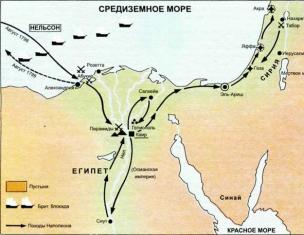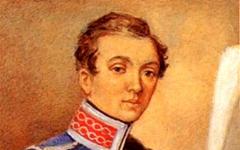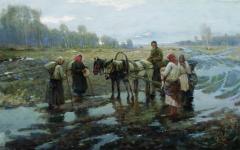A hero was born in a certain country. Baba Yaga gave birth to him and raised him. He grew tall and menacing. His mother went on vacation, and he received unprecedented freedom.
Not knowing what to spend my energy on, I went into the forest. There he began to torture his strength, tear up trees by the roots, and when he got tired, he climbed into a huge hollow and fell asleep. His loud snoring made the earth shake for a long time. People and animals were afraid of him, sleepy.
His fame reached foreign lands, where they were surprised at his power and feared, believing that he had gone to bed for a reason; apparently he was gaining strength. At home they were proud of him and had high hopes, they spoke in whispers, and walked around on tiptoe.
He slept for a hundred, two hundred and a thousand years. At first, the enemies thought that the country was strong in which they feared the hero only because he slept in a hollow, but gradually they began to remember that more than once trouble came, but the strong man did not wake up and did not provide help. There were droughts and famines, fights, diseases and natural disasters, impoverishment, but the sleepyhead didn’t care at all, he didn’t open his eyes or move his ears.
The fate of his homeland was patient and long-suffering; the people believed in their defender and waited, hoping that at the last moment he would awaken.
Meanwhile, the enemies began to lose fear and went to war against Bogatyr. They approached cautiously, but sensing the stinking smell, they carried out brutal reprisals. They destroyed everything in their path. Last time the people called out to the brave man. Not hearing his snoring, Ivan the Fool split the hollow with his fist, and it became clear that the vipers had eaten Bogatyr’s entire body up to the neck.
Russia can be seen in the image of a patient and long-suffering country, where it is typical for the people to rely on Strong Personality, a king or hero who will come and restore order. Each time, in their vain expectation, the people were deceived. Saltykov-Shchedrin ridicules unjustified fear and the hero himself, who, possessing invincible strength, squandered it on sleep and stupidity, remaining deaf and blind to the needs of his compatriots. The author raises the topic of civic duty and the responsibility of each person for his homeland, destiny and well-being.
Picture or drawing Bogatyr
Other retellings and reviews for the reader's diary
- Summary of Pogodin Green Parrot
The book tells about the author's feelings and impressions when fascinated by various smells. For the first time, the narrator smelled cold frost. Standing on the bank of the Nevka, he saw the trees begin to shed their leaves.
- Summary of The Epic of Gilgamesh
This work inherently reflects all the devotion and fidelity to friendship. Despite many things, it is friendship that can overcome all obstacles and ennoble a person.
- Summary of the fairy tale Finist - the clear falcon
There lived a peasant, and soon he became a widower. He left behind three daughters. The man had a huge farm, and he decided to take on a worker as an assistant. However, Maryushka dissuaded him, saying that she would help him in everything. Here she works from dawn to dawn
- Summary of the Opera Pagliacci by Leoncavallo
A troupe of comedians, led by Canio, arrives in Montalto. He invites everyone to his new performance. Residents invite comedians to have a drink at the bar. A man from the crowd jokes rudely, he wants to take Nedda away from her husband
- Summary of the German in Vorobyov's felt boots
A German in Valenki is a story by Konstantin Vorobyov, which shows the life of prisoners of war and the plight of camp prisoners.
Ram-Nepomnyashchy
The Nepomnyashchy Ram is the hero of a fairy tale. He began to see unclear dreams that worried him, making him suspect that “the world does not end with the walls of a stable.” The sheep began to mockingly call him “clever” and “philosopher” and shunned him. The ram withered and died. Explaining what happened, the shepherd Nikita suggested that the deceased “saw a free ram in a dream.”
Bogatyr
The hero is the hero of a fairy tale, the son of Baba Yaga. Sent by her to his exploits, he uprooted one oak tree, crushed another with his fist, and when he saw a third one with a hollow, he climbed in and fell asleep, terrifying the surrounding area with his snoring. His fame was great. They were both afraid of the hero and hoped that he would gain strength in his sleep. But centuries passed, and he still slept, not coming to the aid of his country, no matter what happened to it. When, during an enemy invasion, they approached him to help him out, it turned out that the Bogatyr had long been dead and rotten. His image was so clearly aimed against the autocracy that the tale remained unpublished until 1917.
Wild landowner
The wild landowner is the hero of the fairy tale of the same name. Having read the retrograde newspaper “Vest”, he stupidly complained that “there are too many divorced... men,” and tried in every possible way to oppress them. God heard the tearful prayers of the peasants, and “there was no man in the entire domain of the stupid landowner.” He was delighted (the air had become “clean”), but it turned out that now he could neither receive guests, nor eat himself, nor even wipe the dust from the mirror, and there was no one to pay taxes to the treasury. However, he did not deviate from his “principles” and, as a result, became wild, began to move on all fours, lost human speech and became like a predatory beast (once he did not lift up the policeman’s canard). Concerned about the lack of taxes and the impoverishment of the treasury, the authorities ordered “to catch the peasant and bring him back.” With great difficulty they also caught the landowner and brought him into more or less decent shape.
Crucian idealist
The idealistic crucian carp is the hero of the fairy tale of the same name. Living in a quiet backwater, he is complacent and cherishes dreams of the triumph of good over evil and even of the opportunity to reason with Pike (whom he has seen since birth) that she has no right to eat others. He eats shells, justifying himself by saying that “they just crawl into your mouth” and they “don’t have a soul, but steam.” Having presented himself before Pike with his speeches, he was released for the first time with the advice: “Go and sleep it off!” The second time he was suspected of “Sicilism” and was pretty much bitten during interrogation by Okun, and the third time Pike was so surprised by his exclamation: “Do you know what virtue is?” - that she opened her mouth and almost involuntarily swallowed her interlocutor." The image of Karas grotesquely captures the features contemporary writer liberalism. Ruff is also a character in this fairy tale. He looks at the world with bitter sobriety, seeing strife and savagery everywhere. Karas is ironic about his reasoning, accusing him of complete ignorance of life and inconsistency (Crucian is indignant at Pike, but eats shells himself). However, he admits that “after all, you can talk to him alone to your liking,” and at times he even hesitates slightly in his skepticism, until the tragic outcome of the “dispute” between Karas and Pike confirms that he is right.
Sane Hare
The sane hare, the hero of the fairy tale of the same name, “reasoned so sensibly that it fits a donkey.” He believed that “every animal is given its own life” and that, although “everyone eats hares,” he is “not picky” and “will agree to live in any way.” In the heat of this philosophizing, he was caught by the Fox, who, bored with his speeches, ate him.
Kissel
Kissel, the hero of the fairy tale of the same name, “was so soft and soft that he didn’t feel any discomfort from eating it. The gentlemen were so fed up with it that they gave the pigs something to eat, so in the end, “all that was left of the jelly was withered scraps,” Peasant humility and the post-reform impoverishment of the village, robbed not only by “gentlemen” landowners, but also by new bourgeois predators, who, according to the satirist, are like pigs, “do not know satiety... ".
Mikhail Evgrafovich Saltykov-Shchedrin
Bogatyr
In a certain kingdom, a hero was born. Baba Yaga gave birth to him, gave him water, fed him, groomed him, and when he grew up about a mile away from Kolomna, she herself retired into the desert, and let him go on all four sides: go, Bogatyr, accomplish feats!
Of course, first of all, Bogatyr hit the forest; he sees one oak tree standing - he uprooted it; he sees another one standing - he smashes him in half with his fist; he sees the third one standing and there is a hollow in it - Bogatyr climbed into the hollow and fell asleep.
The green oak tree mother groaned from his rolling snores; Fierce animals ran from the forest, feathered birds flew; The goblin himself was so frightened that he took the goblin with her cubs in his arms - and was gone.
The fame of the Bogatyr spread throughout the entire earth. And their own, and strangers, and friends, and adversaries will not be surprised at him: they are afraid of their own in general because if they are not afraid, then how can they live? And besides, there is hope: the Bogatyr certainly lay down in the hollow in order to gain even more strength in his sleep: “Now our Bogatyr will wake up and glorify us before the whole world.” Strangers, in turn, are afraid: listen, they say, what a groan went across the earth - no way, in “that” land the Bogatyr was born! No matter how he rings the bell for us when he wakes up!
And everyone walks around on tiptoe and repeats in a whisper: “Sleep, Bogatyr, sleep!”
And then a hundred years passed, then two hundred, three hundred and suddenly a whole thousand. Julitta drove and drove and finally arrived. The titmouse boasted and boasted, and in fact did not set the sea on fire. They cooked and cooked the man until all the dampness was boiled out of him: ah, man!
They fixed everything up, they finished everything off, they completely robbed each other - a sabbath! But Bogatyr is still sleeping, still looking out of the hollow with his sightless eyes straight at the sun, and letting the rolling snores go around him for a hundred miles.
The adversaries looked for a long time, thought for a long time: this country must be powerful, in which they fear the Bogatyr just because he sleeps in a hollow!
However, little by little they began to scatter their minds; They began to remember how many times cruel misfortunes were sent to this country, and never once did the Bogatyr come to the rescue of the little people.
In such and such a year, the little people fought among themselves according to bestial custom and killed a lot of people in vain. The old people grieved bitterly at that time, bitterly cried out: “Come, Bogatyr, judge our timelessness!” But instead he slept in the hollow. In such and such a year, all the fields were scorched by the sun and destroyed by hail: they thought the Bogatyr would come and feed the worldly people, but instead he sat in a hollow. In such and such a year, both the city and the village were burned by fire, the people had no shelter, no clothing, no hedgehogs; They thought: the Bogatyr will come and fix the world’s needs - but even here he slept in the hollow.
In a word, for the entire thousand years this country has suffered from all sorts of pains, and not once did the Bogatyr lift an ear or move an eye to find out why the earth was groaning all around.
What kind of Bogatyr is this?
This side was long-suffering and long-suffering and had great and unflagging faith. She cried and believed, sighed and believed. She believed that when the source of tears and sighs dried up, the Bogatyr would seize a moment and save her. And then the moment came, but not the one that the inhabitants were waiting for. The adversaries rose up and surrounded the country in which the Bogatyr was sleeping in a hollow. And everyone went straight to Bogatyr. At first, one approached the hollow carefully - it stinks; another one came up - it also stinks. “But Bogatyr is rotten!” - said the adversaries and rushed to the country.
The adversaries were cruel and unforgiving. They burned and chopped down everything that came their way, taking revenge for that ridiculous age-old fear that Bogatyr instilled in them. The little people rushed about, seeing the dashing timelessness, rushed towards the adversary - they looked, there was nothing to go with.
Then a miracle happened: the hero did not move. Just like a thousand years ago, his head motionlessly looked with sightless eyes at the sun, but no longer emitted those mighty snores that once made the green oak tree mother shudder.
At that time, the fool Ivanushka came up to Bogatyr, broke the hollow with his fist - he looked, and the vipers had eaten away Bogatyr’s body right up to his neck.
Sleep, Bogatyr, sleep!
The hero is the hero of a fairy tale, the son of Baba Yaga. Sent by her to his exploits, he uprooted one oak tree, crushed another with his fist, and when he saw a third one with a hollow, he climbed in and fell asleep, terrifying the surrounding area with his snoring. His fame was great.
They were both afraid of the hero and hoped that he would gain strength in his sleep. But centuries passed, and he still slept, not coming to the aid of his country, no matter what happened to it. When, during an enemy invasion, they approached him to help him out, it turned out that the Bogatyr had long been dead and rotten. His image was so clearly aimed against the autocracy that the tale remained unpublished until 1917.
- Singer Isaac Bashevis Work “Shosha” Red-haired, blue-eyed Arele - Aaron Greidinger, the son of a highly learned rabbi, lives with his family on Krochmalna Street, in the Jewish quarter of Warsaw. Since childhood he knows three...
- Narezhny Vasily Trofimovich Work “Two Ivans, or Passion for Litigation” Summer afternoon. Two young philosophers Nikanor Zubar and Koronat Khmara, having studied for ten years at the Poltava Seminary and “having exhausted...
- Gaidar Arkady Petrovich Work “Timur and his team” Colonel Alexandrov has been at the front for three months. He sends a telegram to his daughters in Moscow, inviting them to spend the rest of the summer at the dacha. Senior...
- Franz Grillparzer Work “The Greatness and Fall of King Ottokar” In the Prague castle of the King of Bohemia, Přemysl Ottokar, confusion reigns among his courtiers. Ottokar divorces his wife Margaret of Austria, the widow of a German...
- Hans Christian Andersen Work “The Road Companion” Johannes is the son of a poor peasant, who received 50 riksdalers as an inheritance from his father and gave his last money for the burial of another poor man, who miraculously turned out to be...
- Oscar Wilde Work “The Egoistic Giant” Every day after school the children played in the wonderfully beautiful garden. But one day the giant returned - the owner of this garden. He kicked out all the children and forbade them to return. He...
- Johann Ludwig Tieck Work “Blonde Ecbert” The action takes place in the German city of Harz in the Middle Ages. Blond Ecbert, a forty-year-old knight, lives with his wife Bertha. They love each other, but...
- Baratynsky Evgeniy Abramovich Work “Gypsy” The action of the “story” (as the author calls “Gypsy”) takes place in Moscow. Early summer morning, drunken guests leave. The owner, Yeletskoy, looks with a “grumpy eye” at the traces of “violent revelry” in his...
- Bunin Ivan Alekseevich Story by I. A. Bunin “ Sunstroke“They met in the summer, on one of the Volga ships. He is a lieutenant, She is a lovely little, tanned woman (she said she was coming from...
- Andreev Leonid Nikolaevich Work “The Life of Vasily of Thebes” Like an ant - grain of sand to grain of sand - Father Vasily built his life: he got married, became a priest, gave birth to a son and daughter. In seven...
- Ryunosuke Akutagawa Work “In the Thicket” The story of the Japanese writer Akutagawa Ryunosuke is considered the best story ever written in the world. Several people talk about the murder that took place, all in different ways, and it is difficult for the reader...
- Tolstoy Lev Nikolaevich Work “Three Deaths” One autumn day two carriages were driving along a high road. Two women were sitting in the front carriage. There was one lady, thin and pale. The other is a maid, rosy...
- Maxim Gorky Work “Sparrow” Sparrows are exactly the same as people: adult sparrows and female sparrows are boring little birds and talk about everything as it is written in books, and young people...
- Menander Work “The Grouch” This comedy in translation has another name – “The Man-Hater”. Its main character, the peasant Knemon, at the end of his life became distrustful of people and hated literally the whole world. However,...
- Carlo Gozzi Work “The Love of Three Oranges” Silvio, King of Clubs, is unusually excited and extremely saddened by the illness of his only son, Prince Tartaglia. The best doctors identified the crown prince's illness as the result of a deep...
- Friedrich Hebbel Work “Mary Magdalene” The play takes place in a small German town in the first half of the last century. In the house of carpenter Anton, known for his hard work and frugality, there are two women, a mother and daughter....
- Turgenev Ivan Sergeevich The work “Asya” N.N., a middle-aged socialite, recalls a story that happened when he was twenty-five years old. N.N. then traveled without a goal and without a plan and...
- Belyaev Alexander Romanovich Work “Amphibian Man” Fantasy novel Alexandra Belyaev’s “Amphibian Man” consists of three parts. The narration is told on behalf of the author. Characters novel: Ichthyander – man –...
- Susan Hill Work “I am the King of the Castle” Warings is the Hooper family home. Edmund's great-grandfather bought it. The family had little money, the land had to be sold over time, but the house remained...
- Theodore Dreiser Work “An American Tragedy” The events that Theodore Dreiser narrates in the novel “An American Tragedy” unfold in America. The main character of the novel is Clyde Griffiths, a young man striving for wealth, fame,...







